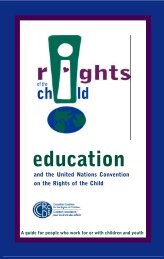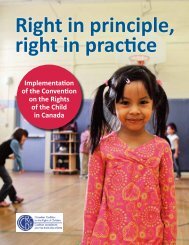Poste - Canadian Coalition for the Rights of Children
Poste - Canadian Coalition for the Rights of Children
Poste - Canadian Coalition for the Rights of Children
You also want an ePaper? Increase the reach of your titles
YUMPU automatically turns print PDFs into web optimized ePapers that Google loves.
C A N A D I A N C O A L I T I O N F O R T H E R I G H T S O F C H I L D R E N<br />
Quebec:<br />
• Life in Society is one <strong>of</strong> six major areas <strong>of</strong><br />
learning in <strong>the</strong> Quebec curriculum. 142<br />
• Citizenship Education is <strong>of</strong>fered from Grade 3 to<br />
<strong>the</strong> end <strong>of</strong> high school.<br />
• Values are explored in moral education and<br />
religious education. 143<br />
Nova Scotia:<br />
• The Public School Program identifies citizenship<br />
as essential learning and should include: human<br />
rights, recognizing discrimination and principles<br />
<strong>of</strong> pluralistic, democratic societies and<br />
multiculturalism. 144<br />
Respect <strong>for</strong> <strong>the</strong> Natural<br />
Environment<br />
As a result <strong>of</strong> major reviews <strong>of</strong> policy and curriculum in<br />
most provinces, greater emphasis on environmental<br />
education has been incorporated across <strong>the</strong> country. 145<br />
The extent and effectiveness <strong>of</strong> this learning objective is<br />
not known.<br />
To support <strong>the</strong> 1992 Rio Declaration on Environment and<br />
Development (Agenda 21), a <strong>Canadian</strong> youth action<br />
guide was developed. 146 Fur<strong>the</strong>rmore, a national nonpr<strong>of</strong>it<br />
organization, Learning <strong>for</strong> a Sustainable Future,<br />
was established to address <strong>the</strong> Rio recommendations on<br />
sustainable development. Since its creation, <strong>the</strong><br />
organization has:<br />
• given workshops to over 2,000 educators;<br />
• assisted with <strong>the</strong> development <strong>of</strong> teaching resource<br />
materials and <strong>the</strong> integration <strong>of</strong> sustainable<br />
development concepts into <strong>the</strong> Atlantic provinces’ core<br />
curriculum, <strong>the</strong> Pan-<strong>Canadian</strong> Protocol <strong>for</strong><br />
Collaboration on Science Curriculum and <strong>the</strong> Western<br />
Common Curriculum Protocol; and<br />
• created <strong>the</strong> Ontario Learning <strong>for</strong> Sustainability<br />
Partnership (OLSP) in 1995. 147<br />
In order to advance <strong>the</strong> development <strong>of</strong> a pan-<strong>Canadian</strong><br />
science curriculum, all ministers <strong>of</strong> education and<br />
teachers’ federations received a report on proposed<br />
amendments to ensure <strong>the</strong> sustainable perspective. 148<br />
90<br />
Environmental awareness is promoted in classroom<br />
work and extra-curricular clubs. For example, <strong>the</strong><br />
Philippine Assistance Development Program, funded<br />
by <strong>the</strong> <strong>Canadian</strong> International Development Agency,<br />
coordinated a project called “Race Against Waste”<br />
where youth from Canada and <strong>the</strong> Philippines made<br />
environmentally friendly toys from recycled materials. 149<br />
Case Study<br />
The unique, award-winning Colquitz Watershed<br />
Stewardship Project in <strong>the</strong> Greater Victoria and<br />
Saanich School Districts, supported by <strong>the</strong> public<br />
and private sectors, has trained 120 teachers in<br />
various environmental programs. Over 4,000<br />
elementary students have completed class studies,<br />
participated on field trips and undertaken projects<br />
to clean streams and school yards, raise salmon,<br />
mark storm drains and plant shrubs and trees.<br />
Junior and secondary students get “Stream Keeper”<br />
college-level training. Following certification, <strong>the</strong>y<br />
become involved in community restoration and<br />
hatchery projects, assist elementary classrooms with<br />
<strong>the</strong>ir field studies, participate in educating <strong>the</strong><br />
public and monitor local water courses. Some<br />
students identified a previously undocumented<br />
hazard to Coho salmon fry, which significantly<br />
improved <strong>the</strong> survival chances <strong>of</strong> thousands <strong>of</strong><br />
fish. 150<br />
Provincial/Territorial Curricula:<br />
Respect <strong>for</strong> <strong>the</strong> Natural Environment<br />
British Columbia:<br />
• Environmental education is to be directed to all<br />
students from kindergarten to <strong>the</strong> post-secondary<br />
level and environmental concepts are integrated<br />
into all subject areas. 151<br />
• Issues include waste management, socially<br />
responsible and ethical economics, conservation<br />
and restoration <strong>of</strong> <strong>the</strong> environment, energy and<br />
resource management, technology and <strong>the</strong><br />
environment, global awareness and<br />
responsibility. 152




